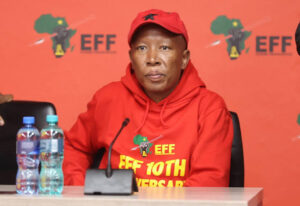
The Economic Freedom Fighters (EFF) have once again set the stage for a major policy showdown in Parliament by introducing a Private Member’s Bill that seeks to impose a total ban on alcohol advertising, promotion, and sponsorship across South Africa. The move, spearheaded by EFF MP Veronica Mente, is aimed at tackling the deep-rooted social and health problems linked to alcohol consumption, which the party says are being fueled by aggressive marketing campaigns.
If enacted, the bill would amend the Liquor Act of 2003, removing the ability of liquor companies to promote their products in any form. This includes advertisements on television, radio, and digital platforms, as well as brand sponsorships of high-profile events such as concerts and sports tournaments. The EFF argues that alcohol advertising portrays drinking as glamorous and socially desirable, while deliberately concealing the negative impacts, which range from gender-based violence and fatal road accidents to the rising burden on the country’s healthcare system.

EFF leader Julius Malema has been vocal in defending the bill, likening it to the ban on tobacco advertising implemented in South Africa more than two decades ago. He insists that the fight against harmful consumption requires tough action and believes that limiting the visibility of alcohol is a necessary step. “We cannot continue to prioritize corporate profits over the lives of South Africans. Public health must come first,” Malema declared.
Despite the moral weight behind the proposal, the EFF faces strong resistance. Critics argue that the bill could have unintended economic consequences, particularly for small businesses and the informal sector. In many communities, taverns and liquor sales form a significant source of income, and some fear that without advertising and sponsorship support, these businesses could struggle to survive.
The advertising and media industries have also sounded alarm bells. Freddy Makgatho of the Advertising Standards Authority of South Africa expressed concerns that the ban could trigger widespread job losses in the creative, broadcasting, and events sectors. He noted that advertising revenue sustains thousands of workers and helps finance local content production and community initiatives.
Supporters of the bill counter that these economic fears mirror those raised during the tobacco advertising ban, which did not result in the predicted collapse of the industry. They argue that industries can adapt and that the long-term savings in public health costs will far outweigh any short-term disruptions.
Health experts and policy analysts are divided on whether an outright ban is the most effective solution. While some back the EFF’s uncompromising stance, others believe that banning advertising addresses only part of the problem. They recommend a multi-faceted approach, including stronger enforcement of existing laws, restrictions on the availability of alcohol, and public education campaigns that highlight the dangers of abuse. Countries such as Norway and Botswana have adopted similar blended strategies with measurable success.
As the proposal makes its way through parliamentary channels, the debate is growing more intense. For the EFF, the bill represents a bold step toward reshaping public health policy. For its critics, it raises serious concerns about livelihoods and economic sustainability. Ultimately, South Africa is being challenged to strike a balance between protecting its people from alcohol-related harm and preserving the jobs and industries tied to the sector. The outcome will reveal whether the country is ready for a radical change or whether a more moderate path will prevail.






